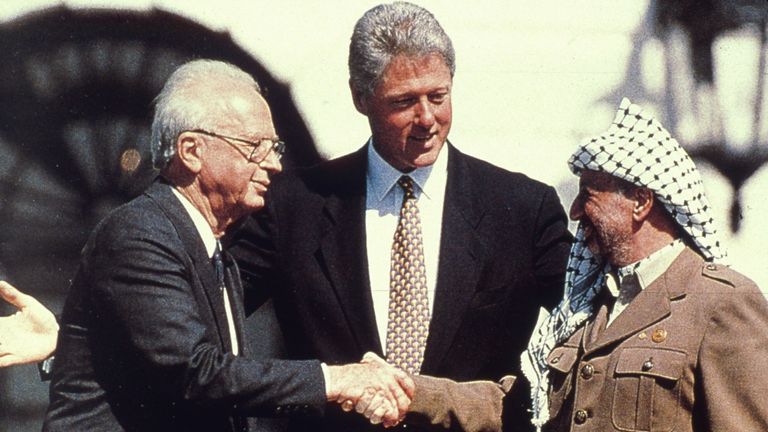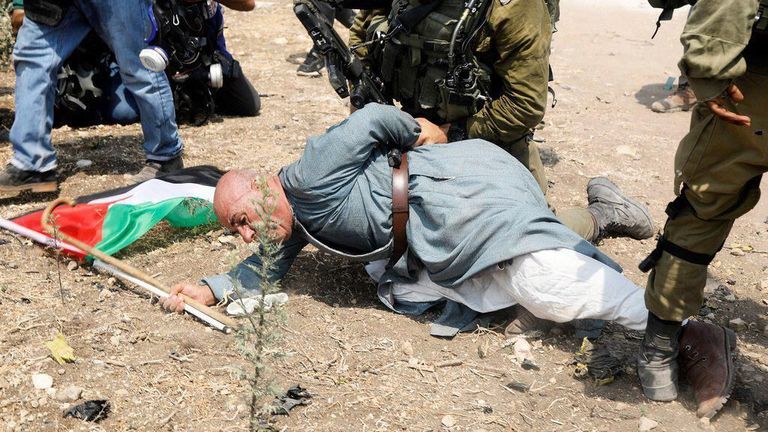At the White House today, Donald Trump is trying to get as close as he can to emulating a moment that happened 27 years this week.
On 13 September 1993 President Bill Clinton brought together two foes. On the White House lawn, Israeli Prime Minister Yitzhak Rabin and Yasser Arafat, the chairman of the Palestinian Liberation Organisation, shook hands.
It was seen, at the time, as an irreversible moment in peacemaking; the first face-to-face meeting between the Israelis and the Palestinians and an agreement on a framework that would lead to the resolution of the conflict between Israel and the Palestinians.
It didn’t work. Years of renewed bloodshed followed which have morphed into low-intensity conflict, a dire equality imbalance and a political stalemate that endures to this day.
The Palestinians continue their struggle for a nation state – a largely peaceful struggle in the West Bank, less so in Gaza. The Israelis manage a status quo which, some argue, suits them just fine.
Enter Donald Trump. With no prospect of getting the Israelis and the Palestinians to repeat that historic handshake, but eager to be seen as the ultimate deal maker, he has pulled off a different feat. It’s not one to be dismissed.
With his son-in-law Jared Kushner as the broker, he has persuaded two Gulf Arab countries to recognise the Jewish State of Israel.
Context is vital here. Until last month, only two Arab countries recognised Israel. Egypt signed a deal in 1979 and Jordan signed one in 1994.
However, the Arab Peace Initiative of 2002 was explicit that no other Arab countries would recognise Israel unless it withdrew fully from the Occupied Palestinian Territories (Gaza and the West Bank) and allowed the establishment of a Palestinian State with East Jerusalem as its capital.
That initiative held until last month when the United Arab Emirates agreed a normalisation deal with Israel.
In return, the Israeli Prime Minister, Benjamin Netanyahu promised to put on hold his plan to annex parts of the West Bank.
So, rather than demanding Israel reverse a fact on the ground in exchange for diplomatic ties, the UAE flipped the offer -if you don’t follow through on annexation, we’ll recognise you.
Bahrain then followed and other Arab countries may do too. It represents a paradigm shift in the geopolitics of the region and it strengthens the alliance against Iran – a common enemy for Israel and many gulf Arab nations.
The prospects for trade and tourism are huge. There’ll be flights between the countries; embassies and ambassadors too.
It is a coup for President Trump. His administration has overseen a process in which the regional dial has moved. That is much more than his predecessor, Barack Obama, can claim.
He has brought Israeli-Arab hands together this week and it makes the perfect re-election image. Donald Trump the deal maker.
But peacemaker? What about the issue at the core of all this? The one that was supposed to be solved with that handshake in 1993?
Well, for the political protégés of Yasser Arafat, the deals amount to a deep betrayal by their Arab brethren. It represents the biggest crisis in the history of the Palestinian Authority.
The Palestinians have been left out. The Americans and the Israelis openly say they are fed up with waiting for the Palestinians to accept their vision for peace – one in which Israel does not need to withdraw from the West Bank and one in which the Palestinians don’t get their own capital in East Jerusalem.
A drive though the West Bank, and it’s extremely hard to see how, at the moment at least, an Israeli-Gulf accord does anything to bring resolution to the Palestinian issue.
Look at it through the hardened eyes of those living there – both Palestinians and Israeli Jewish settlers.
Khairi Hannoun is in his sixties. I met him a day after he was wrestled to the ground by an Israeli soldier.
With a flag and a walking stick, but nothing more, he had been protesting the continued expansion of illegal Israeli settlements into the West Bank.
He refused to move on and faced the consequences.
“They don’t want to keep a single [Palestinian] citizen in this land,” he told me when we met.
“The Israeli occupation differs from any other occupation worldwide. It is an occupation of substitution. This means they want to take over where you are and kick you out of this land. They don’t have solutions. If they tell you they have a solution, they are lying.”
When I told the Israeli military I was interviewing Mr Hannoun they said they would send me a statement.
“Khairi Hannoun is known as an inciter. He has been a regular and reoccurring provocateur in the Judea and Samaria region [the Israeli name for the West Bank], regularly attacking soldiers and using violence against IDF troops, and has been incarcerated in Israeli prison over the years on at least seven occasions due to violence against IDF troops. Since 1979, he was incarcerated for a number of years in Israeli prison.”
The Israeli security forces control over 60% of the West Bank and three quarters of a million Israeli Jewish settlers living in the area.
That is more than triple the number who were in the West Bank in 1993 when that White House handshake promised a peace which never came.
At a bus stop for the exclusive use of Israelis settlers, not Palestinians, I met Rachel Gordon, from London originally.
“When we moved here about 20 years ago, that Arab town was very very small and it’s grown exponentially.” she said, pointing to a nearby Palestinian town.
“But do you not see that you are being a bit hypocritical in the sense that you’re saying the Arab town has grown, but your town wasn’t here at all?” I asked, referring to the Israeli settlement she lives in.
“As far as I am concerned, it’s Israeli territory and the whole of Israel belongs to the Jewish people,” she said.
For decades the Palestinian quest has been their own state – with East Jerusalem as their capital and with Jewish settlers moving back out of the West Bank.
But is that still achievable? Or should Israel’s deal with Gulf Arabs prompt a new Palestinian strategy?
“I think what we have to do as Palestinians is recognise that there is an apartheid one state reality. Accept that as a starting point but not accept that as our future,” Dr Yara Hawari, a policy analyst at Al Shabaka, the Palestinian Policy Network told me.
“[The deal with the Gulf Arabs] really stresses the need for a recalibration of the Palestinian struggle… that we can’t rely on people that we thought were allies, that we have to sort of seek out allyship, friendship, interconnectedness with other struggles, other peoples around the world.”
There are hints of that with parallels drawn between injustices here and elsewhere. ‘Palestinian Lives Matter’ is a slogan you hear more and more.
Donald Trump’s deal should not be dismissed. It represents a characteristic coach and horses through convention. It’s changing the relationship between Israeli Jews and (some) Arabs and it has focused minds among Palestinians.
And so, one day we may be able to draw a line from this moment to peace in the Holy Land. But I can’t quite see its outline yet.




